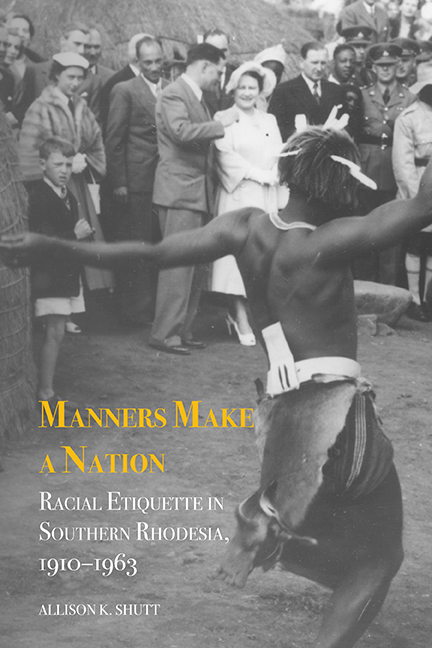3 - Etiquette and Integration
Published online by Cambridge University Press: 04 June 2021
Summary
The mobility and high volume of white immigration after World War II forced Southern Rhodesian whites to integrate newcomers at an unprecedented rate. By most accounts, settled whites rapidly and easily integrated newcomers into the white milieu. Nevertheless, immigrants still needed lessons in how to be uniquely “Southern Rhodesian.” According to more settled whites, white newcomers did not naturally play the role of the privileged yet sensitive, courteous, and kind white, which was the model for the racial etiquette that Rhodesians struggled to perform competently. In the national ideal, being a Southern Rhodesian was not simply a matter of lording over subordinate Africans. Rather, being a proper Southern Rhodesian required a fine balance between the just treatment of Africans and the protection of white prestige. Lapses from this ideal occurred all the time, and though whites were usually able to explain departures from the national ideal to their satisfaction, scandals, even small ones, caused them to debate how to calibrate racial etiquette to an honorable register of propriety and authority. Learning to be a Southern Rhodesian was not as easy as it appeared.
It is difficult to overstate the importance of manners to white Southern Rhodesians in the cultural effort to integrate newcomers. Government offices and political leaders, newspapers and magazines, private clubs and women's institutes—all these entities focused on the problem of rudeness and the need for courtesy in race relations. In addition, the postwar period was an era of widened associations of all kinds. By the 1940s white women in organized associations, particularly the Federation of Women's Institutes of Southern Rhodesia (FWISR) had carved out a position for themselves as a conduit of good manners to the white community at large, white newcomers, and African women alike. White women organized the Homecraft movement as a means to educated African women in the finer points of etiquette and courtesy, and, as such, the association allowed— indeed, demanded—the mingling between white and African women. Indeed, there were more opportunities to be a part of civil society and generate status across horizontal cohorts, even though the limits to hierarchical advance remained rather tightly controlled.
- Type
- Chapter
- Information
- Manners Make a NationRacial Etiquette in Southern Rhodesia, 1910–1963, pp. 78 - 102Publisher: Boydell & BrewerPrint publication year: 2015

